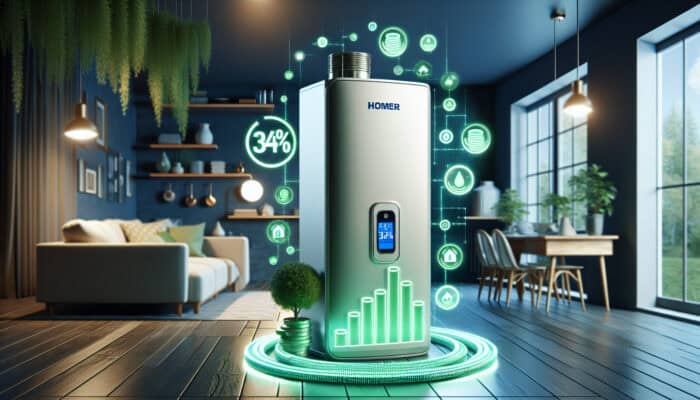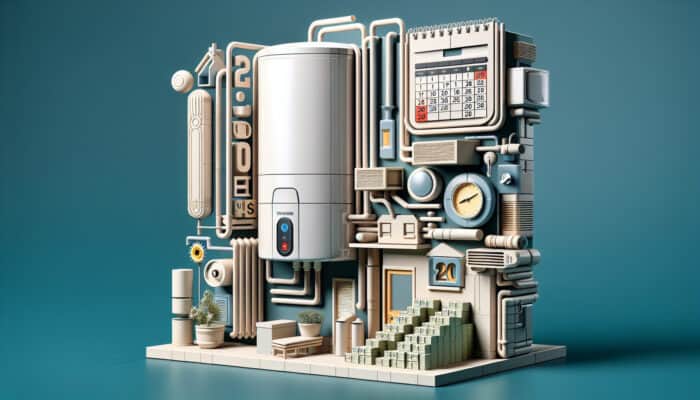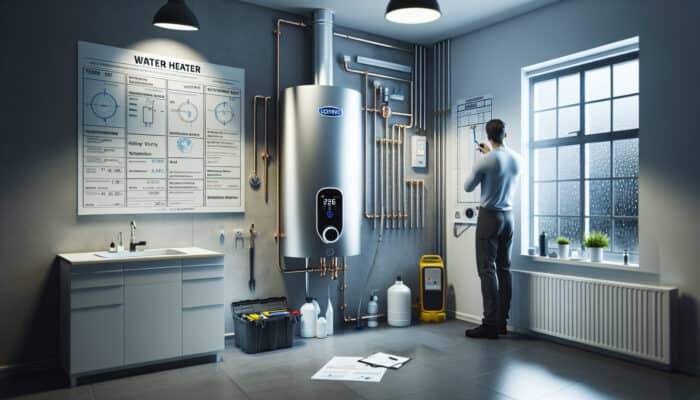Discover the Extensive Advantages of Tankless Water Heaters for Today’s Homeowners
Boosting Energy Efficiency with Innovative Tankless Water Heating Solutions

Tankless water heaters deliver outstanding energy efficiency benefits when juxtaposed with traditional models, culminating in significantly lower utility expenses for homeowners. These cutting-edge systems function on a demand-driven basis, heating water exclusively as required, and effectively eradicates the standby heat loss commonly associated with conventional storage tank heaters. For residents of North Vancouver, this translates to a remarkable reduction in energy use of up to 34%, leading to tangible savings on monthly energy expenditures. Such a substantial decrease not only eases financial burdens but also fosters environmental protection, encouraging a more sustainable way of life.
Choosing tankless water heaters brings forth numerous significant advantages, including:
- Lower energy costs thanks to on-demand heating capabilities.
- A longer operational lifespan, often exceeding 20 years.
- A compact form factor that optimises available space.
- Reduced risk of leaks and associated water damage.
- Flexible installation options that accommodate diverse home designs.
- A reliable supply of hot water, perfect for larger households.
- A commitment to eco-friendly practices through diminished energy consumption.
- A potentially increased home resale value linked to modern upgrades.
By opting for tankless systems, homeowners can markedly lower their carbon footprint, aligning their choices with sustainable living ideals. Embracing energy efficiency is increasingly perceived as a vital commitment to mitigating environmental impacts and nurturing a healthier planet.
Ensuring an Endless Supply of Hot Water for Every Family Member
A tankless water heater guarantees a continuous supply of hot water, a feature that is invaluable for bustling households with multiple users. Whether it’s during the hectic morning rush for showers or while managing laundry and dishwashing tasks, a tankless system can consistently provide a steady stream of hot water without any interruptions. This reliability not only enhances daily routines but also alleviates the frustration associated with cold showers and the need to coordinate hot water usage among family members.
Additionally, the uninterrupted hot water supply fosters more efficient usage. Families can indulge in longer showers, operate multiple appliances simultaneously, or even fill a hot tub without the anxiety of depleting hot water. This convenience becomes especially crucial during the colder winter months in North Vancouver, where access to hot water is essential for comfort and overall well-being.
Optimising Space with Smart Tankless Designs
Tankless water heaters are engineered with space efficiency as a primary focus. Unlike traditional models that consume significant floor space due to their bulky tanks, tankless units are compact and can be conveniently mounted on walls. This innovative design liberates valuable space in utility rooms, basements, or closets, enabling homeowners to repurpose that space for storage or other essential functions.
In urban environments such as North Vancouver, where living spaces can be restricted, the space-saving characteristics of tankless water heaters provide a notable advantage. Homeowners can achieve a more organised and spacious environment while still enjoying the benefits of high-efficiency water heating solutions.
Reaping the Benefits of a Prolonged Lifespan with Advanced Tankless Technology

One of the most impressive attributes of tankless water heaters is their exceptional longevity. Typically, these units can endure for up to 20 years, significantly outlasting conventional tank heaters, which usually last between 10 to 15 years. This extended lifespan reduces the frequency of replacements, resulting in considerable savings for homeowners over time.
Moreover, the sturdy construction of tankless systems means they generally require fewer repairs, contributing to a lower overall ownership cost. Homeowners in North Vancouver can enjoy substantial benefits, as the investment in a tankless system often recoups its cost within just a few years through savings on energy bills and diminished replacement expenses. Furthermore, residents appreciate the dependable hot water supply without the hassle of frequent system replacements.
Professional Insights on Tankless Water Heater Services in North Vancouver
Implementing Optimal Practices for Installing Tankless Systems
Successful installation of tankless water heaters in North Vancouver necessitates a comprehensive understanding of local plumbing systems alongside strict adherence to building regulations. For example, a recent installation in a North Vancouver residence required upgrading the gas line to meet the higher BTU demands of the new unit. Such meticulous attention to detail guarantees that the system functions efficiently and satisfies the household’s hot water requirements.
Essential factors for a successful installation include ensuring a sufficient gas supply for gas-powered units, proper venting to manage exhaust, and providing easy access to the unit for future maintenance. Moreover, selecting a location that minimizes the distance between the heater and the point of use is critical for maximising efficiency. Collaborating with certified professionals who are well-versed in local regulations is vital for a seamless installation experience.
Maintenance Strategies for Ensuring Peak Performance

Regular maintenance of a tankless water heater is crucial for guaranteeing its longevity and operational efficiency. Local experts advise flushing the system at least once a year to eliminate mineral buildup, particularly in areas with hard water, which is prevalent in North Vancouver. This maintenance step is pivotal for sustaining peak efficiency and preventing costly repairs in the future.
Additional practical maintenance recommendations include:
- Regularly inspecting and replacing filters as necessary to ensure optimal performance.
- Examining venting systems for any blockages that could hinder functionality.
- Monitoring for leaks or unusual noises that may signal underlying issues.
- Scheduling professional inspections every few years to confirm that everything is in proper working order.
- Maintaining the unit clean and free of obstructions that could impact efficiency.
- Setting the water temperature to a maximum of 120°F to mitigate scalding risks.
- Documenting maintenance schedules to maintain warranty coverage.
- Utilising a water softener if hard water is a persistent concern.
By following these strategies, homeowners can ensure their tankless systems operate efficiently and provide reliable hot water for many years ahead.
Choosing the Ideal Tankless Water Heater for Your Home's Specific Needs
Selecting the right tankless water heater for your home involves evaluating several critical factors, including household size, peak hot water demand, and local climate conditions. North Vancouver experiences a variety of temperatures, which can significantly influence the effectiveness of your chosen system.
For instance, larger families may necessitate a unit with a higher flow rate to accommodate simultaneous hot water demands, while smaller households may find that a lower-capacity unit suffices for their requirements. Consulting with local experts can provide invaluable insights into the best models tailored to your home’s specific needs, ensuring exceptional performance and satisfaction.
Assessing energy efficiency ratings and warranty options is also essential. Homeowners should compare various brands and models, focusing on those acknowledged for their reliability and customer support within the North Vancouver region.
Identifying Common Challenges and Effective Troubleshooting Approaches
Despite their efficiency, tankless water heaters may encounter various common issues. A frequent problem in North Vancouver is inconsistent water temperature, often stemming from fluctuations in demand or sediment buildup. Homeowners can troubleshoot this issue by checking for appropriate flow rates and ensuring that filters are clean and functioning properly.
Other prevalent challenges include error codes appearing on the unit, which may signify problems such as ignition failure or overheating. Comprehending these codes is crucial for swift resolution. Referring to the user manual can provide guidance regarding error codes and recommended solutions.
For more intricate issues or ongoing problems, seeking professional assistance is advisable. Regular maintenance checks can also help prevent many of these common challenges, ensuring that your system operates smoothly and efficiently.
Assessing the Cost-Benefit Analysis of Tankless Systems
Investing in a tankless water heater typically involves higher initial costs compared to traditional units. However, the long-term financial benefits can be substantial. Homeowners in North Vancouver can expect to recoup their initial investment within just a few years due to decreased energy bills and minimal repair expenses.
When examining the cost benefits, it’s vital to factor in installation costs, which may vary based on the existing plumbing setup and any necessary upgrades. Additionally, local incentives or rebates for energy-efficient appliances can further lower overall expenses.
On average, homeowners can save between $100 and $200 annually on energy bills by switching to a tankless system. Over the lifespan of the unit, these savings can accumulate significantly, making the tankless water heater not only a more efficient choice but also a financially sound investment for homeowners.
How Do Tankless Water Heaters Operate?
Grasping the On-Demand Heating Mechanism of Tankless Systems
Tankless water heaters function based on an on-demand heating principle. When a hot water tap is activated, cold water flows through a pipe into the unit, where it is heated by either gas burners or electric elements. This innovative process eliminates the need for a storage tank, ensuring that water is heated only when it is required.
Key components in this process include the heat exchanger, which transfers energy to the water, and the flow sensor, which detects the demand for hot water. This technology not only conserves energy but also guarantees a continuous supply of hot water, enhancing user convenience.
Understanding this heating mechanism is essential for homeowners considering installation, as it highlights the efficiency and practicality of tankless systems. Proper installation and regular maintenance of these components are vital for ensuring optimal performance and longevity.
Investigating the Varieties of Tankless Water Heaters
There are two primary types of tankless water heaters: electric and gas-powered models. Electric tankless systems are generally simpler to install and require less ongoing maintenance, making them suitable for smaller households or those with lower hot water demands. Conversely, gas-powered units typically deliver higher flow rates and faster heating, making them ideal for larger families or homes with greater hot water needs.
Choosing the most suitable type hinges on various factors, including available energy sources, installation costs, and specific hot water requirements. Homeowners should assess their individual needs and consult with local professionals to determine the best option for their unique circumstances.
Both types have their own merits and drawbacks. Electric models might present lower initial costs but could result in higher energy bills in certain situations. Gas units, while more efficient in heating, require proper ventilation and gas line installation, which can elevate upfront expenses.
Evaluating the Efficiency and Performance of Tankless Systems
Tankless water heaters are celebrated for their remarkable efficiency and dependable performance. These units effectively maintain water temperature, ensuring that hot water is readily accessible whenever needed. Their energy efficiency can be as much as 34% greater than traditional tank heaters, making them a preferred choice among environmentally conscious homeowners.
Performance is influenced by factors such as flow rate and temperature rise, which depend on the groundwater temperature in North Vancouver. Homeowners should consider the incoming water temperature when selecting a tankless system, as colder climates may necessitate units with higher energy output to achieve desired temperature levels.
Routine maintenance is essential for ensuring ongoing efficiency and optimal performance. Homeowners should maintain clean filters and schedule annual servicing to prevent mineral buildup and confirm that all components are functioning correctly.
Professional Installation and Consistent Maintenance Requirements
The installation of tankless water heaters necessitates professional expertise to ensure compliance with local codes and optimal functionality. Important considerations encompass appropriate venting, electrical or gas supply requirements, and ensuring accessibility for future maintenance tasks. Homeowners in North Vancouver should always consult with licensed professionals who possess specialised experience with tankless systems.
Regular maintenance is crucial for extending the lifespan and efficiency of tankless units. Homeowners should routinely check for potential issues, such as sediment buildup, which can adversely affect performance. Flushing the system annually and verifying proper operation can prevent many common problems and ensure a reliable hot water supply.
For those contemplating installation, ensuring that the selected professional is well-versed in local building codes will not only streamline the process but also enhance peace of mind regarding safety and efficiency.
What Financial Considerations Are Associated with Tankless Water Heaters?
Understanding the Initial Investment for Tankless Systems
The initial investment required for a tankless water heater is often higher than that for traditional storage tank models. However, this upfront cost can be significantly mitigated by long-term savings on energy bills. In North Vancouver, homeowners may encounter costs ranging from $1,000 to $3,000, influenced by the size of the unit and its energy source.
While the initial price may appear steep, the durability and efficiency of tankless systems offer excellent value over time. With an average lifespan of up to 20 years, homeowners won’t face frequent replacements, making this a long-term investment that pays off.
Additionally, local rebates and incentives for energy-efficient appliances may be available, further alleviating the financial burden for homeowners transitioning to tankless systems.
Analyzing Installation Costs for Tankless Water Heaters
Installation costs for tankless water heaters can vary widely based on several factors, including the complexity of the installation, existing plumbing conditions, and whether any upgrades are necessary. Homeowners should anticipate installation expenses to range from $500 to $1,500 in North Vancouver, depending on these variables.
It’s essential to work with a licensed and experienced professional to ensure proper installation. Inadequate installation can lead to inefficiencies and safety hazards, making it crucial to invest in a reputable service provider.
In certain scenarios, additional costs may emerge if retrofitting is required to accommodate the new system. Homeowners should budget for potential plumbing or electrical upgrades, particularly for gas-powered units that might necessitate new venting systems.
Evaluating Long-Term Savings Associated with Tankless Water Heaters
Despite the higher initial costs linked to tankless water heaters, homeowners can anticipate significant long-term savings. On average, tankless systems can help homeowners save between $100 and $200 annually on energy bills.
These savings accumulate over time, enhancing the overall value of the initial investment. Moreover, homeowners can benefit from lower maintenance and repair costs due to the durability of tankless systems, amplifying the financial advantages of this choice.
When evaluating the overall cost-effectiveness of tankless water heaters, homeowners should examine both immediate and long-term savings. Understanding the total cost of ownership empowers homeowners to make well-informed decisions regarding their hot water heating solutions.
How to Secure Reliable Tankless Water Heater Services in North Vancouver?
Selecting a Trustworthy Service Provider for Your Tankless Requirements
Choosing a tankless water heater service provider in North Vancouver necessitates careful consideration and thorough research. Homeowners should seek a company that demonstrates professionalism and expertise in the installation and maintenance of tankless systems.
Key factors to consider include:
- Licensing and insurance of the service provider.
- Experience with tankless water heater installations.
- Customer reviews and testimonials reflecting satisfaction.
- Warranty options and service guarantees for peace of mind.
- Clear communication and responsiveness to inquiries.
- Availability of ongoing maintenance services.
- Transparent pricing devoid of hidden fees.
- Knowledge of local building codes and regulations.
By focusing on these criteria, homeowners can ensure they select a trustworthy service provider that meets their specific needs, enhancing their overall experience with tankless water heaters.
Ensuring Quality Service and Dependable Repairs
To guarantee that the service and repairs for your tankless water heater are of high quality, homeowners should always request warranties on parts and labour. This standard practice serves as a safety net, ensuring that any issues that arise shortly after service can be addressed without incurring additional costs.
Furthermore, verifying certifications and affiliations with recognised industry organisations can provide reassurance regarding service quality. Homeowners should actively seek reviews and testimonials from previous customers to assess the reliability and calibre of the service provider.
Understanding the common issues associated with tankless water heaters can also empower homeowners to ask informed questions during the service process, ensuring they receive thorough and effective repairs tailored to their requirements.
Strategies to Extend the Lifespan of Your Tankless Unit
To maximise the lifespan of a tankless water heater, homeowners should adopt a proactive approach to maintenance and usage. Regularly scheduled maintenance, including flushing the system to eliminate mineral buildup, is crucial. Local experts suggest performing this task annually, particularly in areas with hard water.
Best practices for usage include maintaining the temperature at a safe level to prevent scalding and frequently checking for leaks or unusual noises. Homeowners should also ensure easy access to the unit for servicing and inspections, which reduces the risk of complications and enhances overall efficiency.
By keeping up with routine maintenance, homeowners not only extend the unit’s lifespan but also improve its efficiency, ensuring a consistent supply of hot water for years to come.
What Are the Environmental Benefits of Tankless Water Heaters?
Contributing to a Reduced Carbon Footprint
Tankless water heaters generate fewer greenhouse gas emissions compared to traditional models, establishing them as an environmentally conscious choice for homeowners. By utilising energy more efficiently, these systems contribute to a significant reduction in overall energy consumption, a critical factor in combating climate change.
For residents of North Vancouver aiming to lessen their environmental impact, selecting a tankless system represents a proactive step toward sustainability. This decision signifies a commitment to reducing one’s carbon footprint and promoting eco-friendly practices within the home.
Embracing energy-efficient appliances is one effective method homeowners can engage in sustainable living, contributing to a healthier environment for future generations.
Promoting Water Conservation with Innovative Tankless Technology
Tankless water heaters bolster water conservation initiatives by heating water on demand. This pioneering system minimises water wasted while waiting for hot water to reach the tap, a common issue associated with traditional tank systems. Homeowners can enjoy immediate access to hot water without letting the faucet run, which is particularly beneficial in regions facing water shortages.
By reducing water wastage, tankless models encourage responsible water usage and align with broader conservation objectives. This practice is especially crucial in areas like North Vancouver, where environmental sustainability is increasingly prioritised.
Choosing tankless water heating solutions allows homeowners to take significant strides toward more sustainable water consumption practices, positively impacting local ecosystems and communities.
Encouraging Sustainable Energy Use in Households
Tankless water heaters utilise energy more efficiently than traditional storage systems, thereby promoting sustainable energy use within the home. By heating water solely as needed, these systems diminish unnecessary energy consumption, ultimately leading to lower utility bills and decreased reliance on fossil fuels.
The transition towards energy-efficient technology plays a vital role in fostering sustainable practices within households. For residents of North Vancouver, adopting a tankless water heater can significantly enhance energy conservation efforts, contributing to a more sustainable community.
As homeowners become increasingly conscious of their energy consumption patterns, opting for tankless systems positions them as active participants in the solution for a greener future.
Addressing Common Issues and Solutions for Tankless Water Heaters
Effectively Managing Mineral Buildup
Mineral buildup is a prevalent challenge for tankless water heaters, particularly in areas with hard water, such as North Vancouver. Over time, calcium and lime can accumulate within the system, diminishing efficiency and potentially leading to costly repairs. To mitigate this issue, homeowners should contemplate installing a <a href="https://limitsofstrategy.com/tankless-water-heater-services-expert-guide-for-delta-residents/">water softener</a> to prevent mineral deposits from forming.
Regular maintenance is vital for effectively managing mineral buildup. Homeowners should flush their tankless systems at least once a year, or more frequently if hard water is a significant concern. This process involves running a descaling solution through the unit to dissolve and eliminate deposits, ensuring optimal performance and longevity.
By proactively addressing mineral buildup, homeowners can extend the lifespan of their tankless water heaters and maintain efficient operations, ultimately decreasing the likelihood of unexpected repairs.
Troubleshooting Common Error Codes
Many modern tankless water heaters are equipped with diagnostic capabilities that display error codes when issues arise. Understanding these codes is essential for homeowners to address problems quickly and effectively. Common error codes may indicate issues such as ignition failure, overheating, or venting complications.
Homeowners should consult the user manual for specific codes and recommended troubleshooting steps. In many cases, resetting the unit or checking connections can resolve minor issues. However, persistent error codes often signify the need for professional service to diagnose and rectify underlying problems.
Keeping a record of error codes and their resolutions can assist homeowners in tracking recurring issues, leading to more effective long-term solutions and ensuring reliable access to hot water.
Maintaining Consistent Water Temperature for Optimal Comfort
Inconsistent water temperature can be a source of frustration for homeowners using tankless water heaters. Common causes include inadequate gas supply for gas units or sediment buildup affecting the heat exchanger. Both issues can lead to irregular heating and disrupt daily routines.
To preserve consistent water temperature, homeowners should verify that their gas lines are appropriately sized and functioning correctly. For electric units, ensuring that voltage levels meet the manufacturer’s specifications is critical. Regular maintenance, including flushing the system to prevent sediment accumulation, helps maintain steady temperatures.
If temperature fluctuations persist, consulting a professional service provider can offer insights into potential issues and effective solutions, ensuring uninterrupted access to hot water for all household needs.
Frequently Asked Questions About Tankless Water Heaters
What defines a tankless water heater?
A tankless water heater generates hot water on demand by directly heating water as it flows through the unit, eliminating the necessity for a storage tank.
How much can I save by transitioning to a tankless water heater?
Homeowners can anticipate savings between $100 to $200 annually on energy bills by switching to a tankless water heater, thanks to improved energy efficiency.
What is the average lifespan of a tankless water heater?
Tankless water heaters typically last up to 20 years, significantly longer than conventional tank heaters.
Can I install a tankless water heater myself?
While some homeowners may attempt DIY installations, it is highly recommended to hire a professional to ensure safety and compliance with local codes.
What maintenance is required for tankless water heaters?
Regular maintenance includes flushing the system annually to remove mineral buildup, checking filters, and ensuring proper venting to maintain efficiency.
Are tankless water heaters more energy-efficient than traditional models?
Yes, tankless water heaters generally offer 24-34% greater energy efficiency than traditional tank models, resulting in lower utility costs.
What types of tankless water heaters are available for homeowners?
There are electric and gas-powered tankless water heaters, each with distinct advantages based on household needs and available energy sources.
What steps should I take if my tankless water heater displays an error code?
Consult the user manual for the specific error code and follow troubleshooting steps. If problems persist, seek professional assistance for diagnosis and repair.
Can hard water damage my tankless water heater?
Yes, hard water can lead to mineral accumulation, which diminishes efficiency and lifespan. Installing a water softener can effectively mitigate this issue.
What strategies can I implement to maximise the lifespan of my tankless water heater?
Consistent maintenance, including annual flushes and monitoring for leaks, can greatly enhance the lifespan and efficiency of your tankless water heater.
Connect with us on Facebook!
The Article: Tankless Water Heaters Services in North Vancouver: Your Expert Solution First Published On: https://pacificbluemechanical.ca/
The Article Tankless Water Heater Services: Expert Solutions in North Vancouver Was Found On https://limitsofstrategy.com
